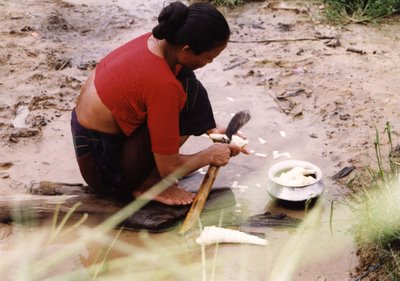UN PFII- Statement UN Peacekeeping and Indigenous Women

5th Session of the United Nations Permanent Forum on Indigenous Issues
United Nations Headquarters, New York
May 15-26 2006
Agenda Item : 4c
Statement on Indigenous Women
Presented by Mililani Trask
On behalf of Na Koa Ikaikai Kalahui Hawaii, Jumma Peoples Network International, Action pour la Promotion des Droits des Minorities Autochtones en Afrique Centrale, Buffalo River Dene Nation, Confederacy of Treaty Six First Nations, International Indian Treaty Nations Council, Land is Life, Sami Council, Jumma Peoples’ Network-Japan, Vanishing Rites, Shimin Gaikou Centre, Aliansi Marfarakat Adat Nusantara (AMAN), Grand Council of Crees, Peace Campaign Group, Indian Confederation of Indigenous and Tribal Peoples’, American Indian Law Alliance, Ka Lahui Hawaii, Kamakakuokalani Center for Hawaiian Studies, Indigenous Information Network, African Indigenous Women’s Organisation, IWGIA, South Asia Indigenous Women’s Forum, Indigenous Women’s Peace Network Nepal, Chin Human Rights Organisation, Elmolo Eco-Tourism Rights and Development, Maa Civil Society Forum, Aseto, Native Women’s Association of Canada, Bangladesh Adivasi Forum, Taungya
Indigenous communities were very actively participating last year and unfortunately must take the floor again this year, as there has been an intensification and continuation of conflict on our lands.
Rape and sexual violence targeting indigenous women and girls has long been employed by military in Bangladesh, Burma, India and Nepal. These are not sexual crimes, but a systematic and brutal policy that targets indigenous women as a weapon of war, torture and subjugation against the whole community. It is both extremely worrying and ironic that Bangladesh, Pakistan, India and Nepal, with histories of violating the rights of indigenous people, and gender based violence are among the top five contributors to UN Peacekeeping missions. These four countries made up over 44% of all UN Peacekeeping personnel for April 2006. The lucrative foreign revenue this brings in helps to support and perpetuate the militarization on indigenous lands in Asia.
UN Peacekeepers are an important component in restoring normality after the turmoil and horrors of war. There are currently 17 UN peacekeeping missions worldwide, including recently deployed Sudan.
The allegations of sexual abuse of women and children by UN Peacekeepers have reached alarming levels in the Congo. These have led to the resignation of William Lacy Swing, head of the UN Mission to the Congo, and an independent investigation into the allegations at Bunia by the Office of Internal Oversights Services (OIOS). However, what has not been investigated is the rapes of indigenous women from the DRC Pygmy population. These are not ‘dollar a day’ women to be found hanging around the UN camps, as referred to by the international press.
The UN General Assembly approved a Code of Conduct in operation for all UN peacekeeping missions. Rule four states that they should ‘not indulge in immoral acts of sexual, physical or psychological abuse or exploitation of the local population or United Nations staff, especially women and children.’
I would like to make the following recommendations to improve both the accountability of military personnel and of UN Peacekeepers, as we see this as two sides of the same ugly coin:
• We reiterate the recommendation of the 4th session of the PFII that the DPKO develop a policy on indigenous peoples with the active participation and in consultation with indigenous peoples.
On a practical level we would like to recommend the following:
Prior to deployment on UN Peacekeeping missions:
• The DPKO should screen and monitor the human rights records of contingents (only certain categories are currently screened) to ensure military and civilian personnel in countries with a history of human rights abuse are not deployed on peacekeeping missions
• The database of human rights abusers or ‘blacklist’ being developed by DPKO should be open to contributions from indigenous peoples and human rights groups with experience and evidence of human rights abuses
o Under the current system it is virtually impossible to track abusers thus conveying complete impunity
• DPKO should monitor and ensure contributing states carry out appropriate pre-deployment gender training, this should be carefully scrutinised for countries, such as Bangladesh, India and Nepal where there is already evidence of human rights abuses
• Preparatory visits by DPKO to contributing countries to check kit and equipment should also be used to check the suitability of potential peacekeepers and the gender training they have (or have not) received
o Meetings with human rights organisations, indigenous peoples organizations, indigenous peoples groups and women’s rights groups can also be organised during the DPKO preparatory visit to corroborate or confirm human rights abuses by specific military or civilian personnel
• Improve gender and indigenous training materials of peacekeepers prior to and during peacekeeping missions
o This should involve the development of appropriate materials tailored to the educational and cultural needs of the contributing troops
• To urge member states to prosecute their nationals accused of human rights violations while serving as UN peacekeepers
• The UN should lift diplomatic immunity for its own staff accused of criminal acts in the Congo and elsewhere, opening the way for prosecution
• The UN Security Council should exclude countries whose peacekeepers have a history of human rights violations from future operations. The UN should publicly name and shame those countries whose peacekeepers have carried out abuses in the Congo and elsewhere
• Encourage the recruitment and deployment of women and indigenous people (as both military and civilian) personnel on peacekeeping missions
• Finally, we urge the Special Rapporteur on Violence Against Women to carry out a study on the issue of violence against women perpetrated by peacekeepers with the participation of indigenous women and communities
Thank you for your time Madame Chair



